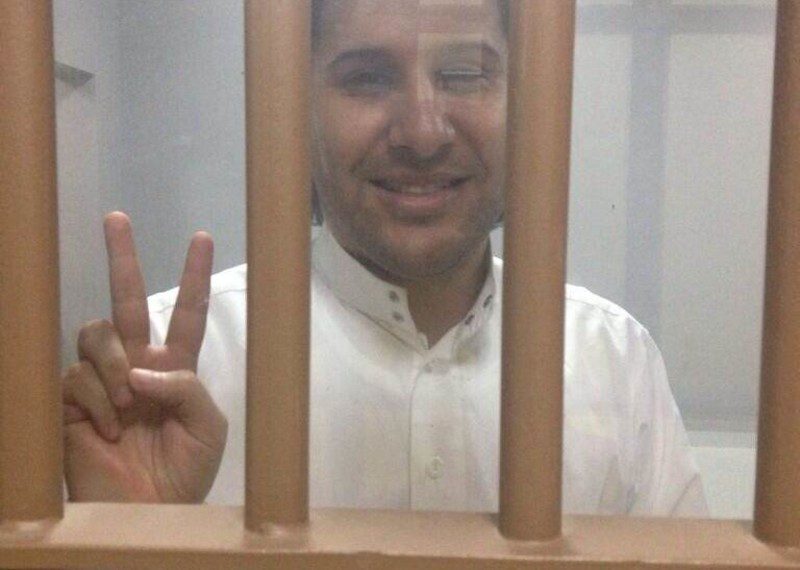By Waleed Abu al-Khair, a Saudi Arabian human rights lawyer, who was detained last month following his fifth court session for number of charges including “breaking allegiance to and disobeying the ruler” and disrespecting the authorities. He wrote this before his impending detention.
Writing while waiting to go to prison is like bidding your loved ones farewell before you leave on an arduous, faraway and risky mission. You don’t know whether you will make it back, or if you will ever see them again!

I write these words while awaiting the moment when the police call and summon me to serve a prison term of three months. But my imprisonment might drag on for years, pending the outcome of another case before the court on more serious political charges.
As I’m writing these words, ideas crowd each other out, leaving but a frail trace of sharp, direct and candid words. These are the words that came across my mind seven years ago – when I first embarked on the journey of my rights-based work.
”Do I hate anyone?” I wonder, particularly those who have insulted me and my family, using the foulest of words in the course of the investigations? Do I hate those who imposed a travel ban on me for years with no legal reason? Do I hate the judge who ordered that I be put in jail simply because I have a signed a statement calling for fair trials? Or should I hate the Prince, whose emissaries have continuously threatened me with being put in prison for years if I refrain from signing an affidavit? Do I hate men of religion who drafted heinous reports about me to the security agencies – full of lies and proclaiming me an apostate? Or should I hate the people using pseudonyms on new media outlets, so they could lie about me and my family so as to damage my reputation further?
I reach deep within my heart and find that I bear no grudge against anyone. I realize that I rather feel sorry for them, the same way I feel sorry for those who decided to give up their freedom, just like an alcoholic who roams aimlessly after willingly giving up his mind to liquor.
And I wonder whether or not I am ready for what is coming. At this moment in particular, I do recall my reasons and that life has a goal; I do remember that those who lived to achieve noble high goals have been more capable of confronting difficulties and overcoming them. I do recall that once I lose these reasons, I would die; at best, I am on the path to degradation. In Saudi Arabia, we live a special challenge – the challenge to be free and to own yourself, your inner being, as well as to be a human rights defender in the face of a political power that employs all of its resources and capacity to dominate the judiciary so as to send you to jail and silence your voice. That challenge is not the only one, however. There is yet a greater societal challenge, as we bear the brunt of extremism and stagnation – which the political authorities wish to perpetuate, to bolster their own legitimacy. The authorities combat these issues, yet at the same time seek to keep them alive in order to foster the inner feelingthat the society will always need them. They hope to demonstrate that the world has no intention of pressuring them as long as they are busy combating extremism as they claim, while providing oil to superpowers.
Thus, the nation is reduced to materialism that is void of meaning. As long as the oil keeps flowing, the world will turn a blind eye if Saudi Arabia continues to crack down on freedom and human rights.
The exception here involves a type of very spiritual people who suffer a lot in the eyes of others but are jubilant and overtly happy deep within. They feel like this simply because they cling onto great hopes – they are resilient in the face of all hardship. They are supported by human rights activists from all over the world and feel overwhelmed by their kindness and solidarity. One of them once said in front of a courtroom after being threatened to be sent to prison by the presiding judge: “Even from prison, you can still light a candle”.
Dr. Abdullah al-Hamid is in prison now alongside his comrades in human rights work. They are the bright light in that pitch-black darkness. Stars cannot be seen during daylight; companions only shine in the darkness of night. They shine against darkness and oppression as campaigners for human rights, social peace and a more glorious and sovereign homeland.
Homelands can overnight be caught in very difficult conflicts; they can also become your companion of choice that would never give up on you or disappoint you. This has been the way of all comrades and friends, for they love freedom and work towards it in their words and deeds.
Because freedom is cultivated, its seeds are those who have sacrificed a lot and have made the sky the limit to their sacrifice. They created a sense of inner peace for themselves that only they can understand. That is why I shall be flying high with them, even from behind bars. In prison I will never need a window that opens out to the sky. I do not need a door to explain to the world why I am there in prison. What I truly need lies within your conscience and every free conscience.
There will always be free souls in this world who will not be silenced by oil!
Read more:
Saudi Arabia jails lawyer and human rights activist in ongoing crackdown on dissent (News story, 16 April 2014)

